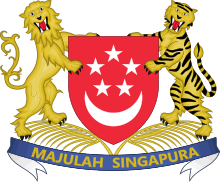Singapore Civil Service
The Singapore Civil Service are the set of civil servants working for the government of Singapore. Many of its principles were inherited from the administrative system left by the British Civil Service, as Singapore were once under the United Kingdom. The group, a subset of the Public Service of Singapore, employs about 84,000 officers in the government ministries as of 2017.[1]
 |
|---|
| This article is part of a series on the politics and government of Singapore |
|
Related topics |
|
|
Thomas Friedman of the New York Times considers the Singapore civil service to be one of the most efficient and uncorrupt bureaucracies in the world, with a high standard of discipline and accountability.[2] It is also considered a key contributor to the success of Singapore since independence. While others contend that the long-time dominance of the People's Action Party (PAP) on civil office can lead to complacency and groupthink, with the supporting ministries being resistant to alternative views and fundamentally unprepared for a change of government.[3][4]
Overview
The civil service was inherited from the British system. Since Singapore's independence, the civil service has been closely tied with the ruling People's Action Party.[5][6] Not all employees of the state and public institutions or corporations are civil servants. Usage of the term is usually reserved for employees working in government ministries and organs of state. These include positions in various schemes of service, including the Administrative Service, legal, education, police, civil defence as well as other generic schemes.[7] Those employed in statutory boards are known as "public servants".
Many Singaporean students have been offered Public Service Commission and Singapore Armed Forces scholarships for their tertiary and post-graduate education over the years, and with some of the top students eventually holding senior positions in the government ministries.[8][9] Top civil servants are sometimes seconded to grassroots organisations or involved with grassroot activities, however, some believed such close proximity to politicians draws the risk of "blurring the lines between the civil servants’ official and political roles". Many Singaporean cabinet ministers and political leaders are drawn from the civil service. In an article for Today, socio-political commentator and former public servant Devadas Krishnadas believe that the pattern of civil servants entering politics "can be misconstrued by the public that the service is politicised", and that entering politics from civil service is a natural career progression.[10]
Previously, permanent secretaries in each ministry were permanent in their postings. The current practice is to rotate them in various ministries every few years.[11]
Head of the Civil Service
The highest ranking civil servant is the head of the Civil Service. The position holder is accountable for ensuring that the civil service is equipped with the skills and capability to meet the everyday challenges it faces and that civil servants work in a fair and decent environment. The head of the Civil Service as of September 2017 is Leo Yip, who also holds the positions of Permanent Secretary at the Prime Minister's Office (Strategy Group) and National Security and Intelligence Coordination.[12]
Code of conduct
Civil servants need to declare casino visitation within a week if they went to 2 local casinos more than four times a month, or if they have bought an annual entry pass.[13]
See also
References
- "The Public Service". Public Service Division, Singapore.
- Thomas L. Friedman (14 September 2005). "Singapore and Katrina". New York Times. Retrieved 5 September 2010.
- Han, Fook Kwang (1 October 2017). "The politics of dominance: Don't take it to the limit". The Straits Times.
- Kuah, Adrian (7 October 2017). "Whither the civil service? The risks of the loss of PAP dominance". The Middle Ground.
- "Civil service must never be politicised, says former chief Peter Ho". The Straits Times. 7 December 2017.
The civil service and the PAP have worked together for so long that they have developed an "instinctive understanding" of each other.
- "Public Service – Are You Really Lovin' It?". Challenge. PS21 Office, Public Service Division, Prime Minister's Office.
- "PSD - FAQs Is the Civil Service part of the Public Service?". www.ifaq.gov.sg.
- "Go East, young bureaucrat". The Economist. 17 March 2011.
- "What 'scholar' really means in Singapore". Singapore Business Review.
- "Civil Service: Keeping it a success factor". www.todayonline.com.
- "Former EDB Chairman Philip Yeo's latest biography sheds light on leadership pitfalls | The Peak Singapore - Your Guide to The Finer Things in Life". The Peak Singapore. 6 February 2017.
- "Head of civil service Peter Ong to retire on Sep 1, Leo Yip to take over". Channel NewsAsia.
- "Tighter casino visit rules for civil servants". www.todayonline.com.